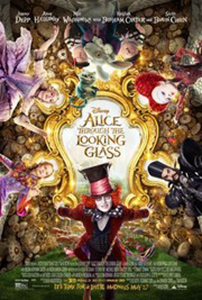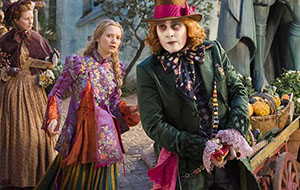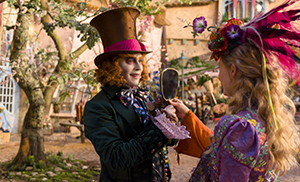There is a scene in “Alice Through the Looking Glass” where the plot suddenly jumps to find Alice locked up in a mental institution. There’s a little hope that the contrived plot up to that point has been an elaborate setup to show that Alice has been having a “St. Elsewhere” moment. Alas, that’s not the case. For reasons that never are fully clear, we are quickly returned to Underland to endure more bastardization of Lewis Carroll’s writing in the form of an LSD flashback. Life imitates art and you’ll find yourself wishing that this whole movie has been a bad dream that you need to wake up from.
In Disney’s “Alice Through the Looking Glass,” an all-new spectacular adventure featuring the unforgettable characters from Lewis Carroll’s beloved stories, Alice returns to the whimsical world of Underland and travels back in time to save the Mad Hatter. Alice Kingsleigh (Wasikowska) has spent the past few years following in her father’s footsteps and sailing the high seas. Upon her return to London, she comes across a magical looking glass and returns to the fantastical realm of Underland and her friends the White Rabbit (Sheen), Absolem (Rickman), the Cheshire Cat (Fry) and the Mad Hatter (Depp), who is not himself. The Hatter has lost his Muchness, so Mirana (Hathaway) sends Alice on a quest to borrow the Chronosphere, a metallic globe inside the chamber of the Grand Clock which powers all time. Returning to the past, she comes across friends – and enemies – at different points in their lives, and embarks on a perilous race to save the Hatter before time runs out. (Synopsis by Walt Disney Pictures)
While the first Tim Burton “Alice” was a fairly miserable experience, at least it followed the general idea of Carroll’s writing. This made up for some of its need to emphasize spectacle over all else. “Through the Looking Glass” gives up even pretending that there is a movie to be made from the source material, and plows ahead with a completely contrived plot based largely on how many colors can be put on the screen at the same time. Not to say that the source material would have made a better film (it wouldn’t—the book is a disjointed mess, too), but this wholly unnecessary attempt fails on so many levels, it becomes more of an endurance challenge for the audience.
The premise is that Alice has to save the Hatter from his inner demons because they are “the truest of friends.” Because only the “truest of friends” talk to each other twice in their entire lives, in interactions may have been nothing but the product of a peyote overdose. Simply put, there is nothing ever established to show that the friendship of Alice and the Hatter is anything more than a plot contrivance. Over the course of two movies, the writers couldn’t establish a realistic friendship between two characters or a reason to care about their problems. Do you care about why the Hatter is sad? No? He has a family that he lost, so how about now? Still no? Ok. How about…they might still be alive? Wait! Where are you going? I need you to care about this! The rest of the plot revolves around the backstory the Wonderland gang. As Patton Oswalt once joked, “I don’t need to know where the things I like come from! I just like the things I like!” Here, you’ll be hard-pressed to like any of the characters, much less their history.
Burton wisely stepped away from helming this film, likely because there is nowhere for any of these characters to go thematically. Outside of Alice, the supporting cast exists solely as whimsical entertainment based on their varying amounts of absurdity. Attributes such as “most colorful” and “possibly deranged” are not going to win over an audience. No matter how hard you try to attach a convoluted back story to “friendship,” there simply is not enough actual character development to carry the load.
Alice is sort of the exception to this rule, but is shown as the product of so many tropes that she fares little better. Her defining characteristic is being an “independent woman in the 1800s.” Nothing rings truer than 1800s era men taking orders from a lady. A woman, leading men!?! How ridiculous! The film can’t even get this plot beat right—it later shows the Queen being truly progressive by washing dishes and caring for her daughters while the King is presumably out with his buddies smacking the “women’s hysterics” out of some other mouthy dame. Seriously, what kind of Queen does her own dishes?
If it there any high points, it is the quality of the cast trying to make this mess work. The sad drawl of Alan Rickman in one of his final film appearances is far more visceral than anything the characters attempt to emote. Sacha Baron Cohen does a serviceable job as the vaguely defined victim-villain. The rest of the cast is pretty much the same as in the “Alice in Wonderland,” just with diminished roles. However, Johnny Depp reaches a whole new level of over-acted creepiness. Willy Wonka was bad enough, but his portrayal of the Hatter floats somewhere between Buffalo Bill from “The Silence of the Lambs,” and a child abductor. Every time he interacts with another character you’ll tense up, waiting for him to gently slide a knife into their back and stuff them into a panel van. Granted, the intentionally outsized personalities of the characters are part of the fantasy of Underland, and the rest of the cast is close enough, at least in tone. Depp takes it 10 steps too far down the rabbit hole.
This is a lot of words to get to the basic problem that this film is simply not enjoyable to watch. There is too much focus on spectacle. There isn’t a relatable character to be found. The plot is so loosely constructed it barely makes sense as it flies by. Johnny Depp’s acting is best described as “I’ve murdered a hobo and decided to wear his skin.” The premise of Alice and the Hatter’s friendship is so shakily established as to be unbelievable. The “lessons” learned about equality, friendship, and family are contrived at best. Bottom line: save your money.
“See It/ Rent It/ Skip It”: Skip it. Just when you think it can’t get any worse, the credits roll and P!nk’s “Just Like Fire” plays. Glad we got Danny Elfman on board, just to push him out of the way for some pop music placement.
ONE AND A HALF STARS out of four.
Directed By: James Bobin
Rated PG for fantasy action/peril and some language.
Runtime: 1 hr. 48 min.






Everything tim burton has ever made sucked. I have never understood some people’s fascination with his boring crap, and hollywood keeps letting him roll more out.